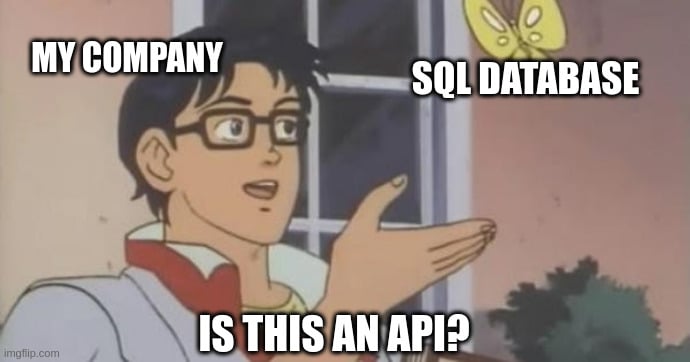You've got to wrap the already basically-just-English SQL database in a layer of abstraction, then serve that as a proprietary API that's impossible to access without a precompiled library that targets a programming language you're not using and exposes methods that are 10x more difficult to use than a SELECT statement.
You significantly cut down on SQLi vulnerability by obscuring the database behind multiple layers of API calls though
Do you really? If you have permissions set up properly, it really seems like an API over a read-only SQL server is just an unnecessary layer of abstraction.
If your database is really big and suffers from large volumes of queries in a short time, it's easier to implement rate limiting in the API than by configuring SQL server permissions.
It's also easier to interact with stored procedures across multiple databases, from multiple clients, if you have a 1-to-1 API wrapper for your database procedures. This also lets you serialize your database response in a potentially more portable format than what your database returns directly, such as JSON.
The API wrapper isn't a silver bullet for security and scalability, but it is a unified framework to configure better security policies and unify multiple databases.
I admit, however, that multiple layers of API abstraction is a bit of a meme, just to keep everyone on their toes.
My job consists of creating internal apis for databases to be consumed by internal systems. So yes, wrapping databases in APIs is very common and sometimes required.
The part I find weird of my job, is that the database isn't one of our team. We're accessing someone else's database, to be consumed by our own api, and writing a api to do so nicely. That's the crooked part.
This is insanely common, tbh.
It's common, but still a tad weird.
Technichally yes, SQL is an API.
Not a RESTful one, nor an HTTP one, but SQL over a socket is very much a type of API...
But I'm guessing we meant an HTTP RESTful API in which case god I hope not
"I want a proper api that does work, slap the DB on a socket, none of that resting HTTP stuff"
GET /api/database?query=SELECT+++name+++FROM+++users+++WHERE+++id=42
I've seen that exact type of endpoint, hitting databases in production. 🔥

If that's a pass through, that's bad.
If that's used for authentication, authorization, credential limiting, or rate limiting, then sure.
There is no context in this world validating this level of unsanitized SQL. Even for internal use this is bad, since it bypasses the auth of server and dbms.
That is a very good point.
How does that work? You mean you allow API clients to execute arbitrary queries? How has nobody nuked your DB yet?
You mean a Snowflake instance?
SurrealDB recommends that you use their DB by giving clients direct database access lmao
Okay, hear me out. We do Stalinism, but exclusively for coding.
Should I ask you to explain? I'm scared.
I was shortly in a project where the team and the customer meant the fucking Oracle DB when they were talking about "the backend".
There was Java Spring Boot (on some outdated, old old version), but all it did was pass args from a "REST" API (doing essentially RPCs with POSTs is REST, right?) to the DB.
The DB then had functions upon functions written in pl/sql that did the actual work.
I have no idea who the fuck thought that that was even remotely a good idea.
Anyways - I am happy to have moved on to better, more sensible projects :D
Not ridiculously pedantically, of course... but yes
Some assembly required.
How do we teach new engineers to build unit tests? "Have copilot write them."
Programmer Humor
